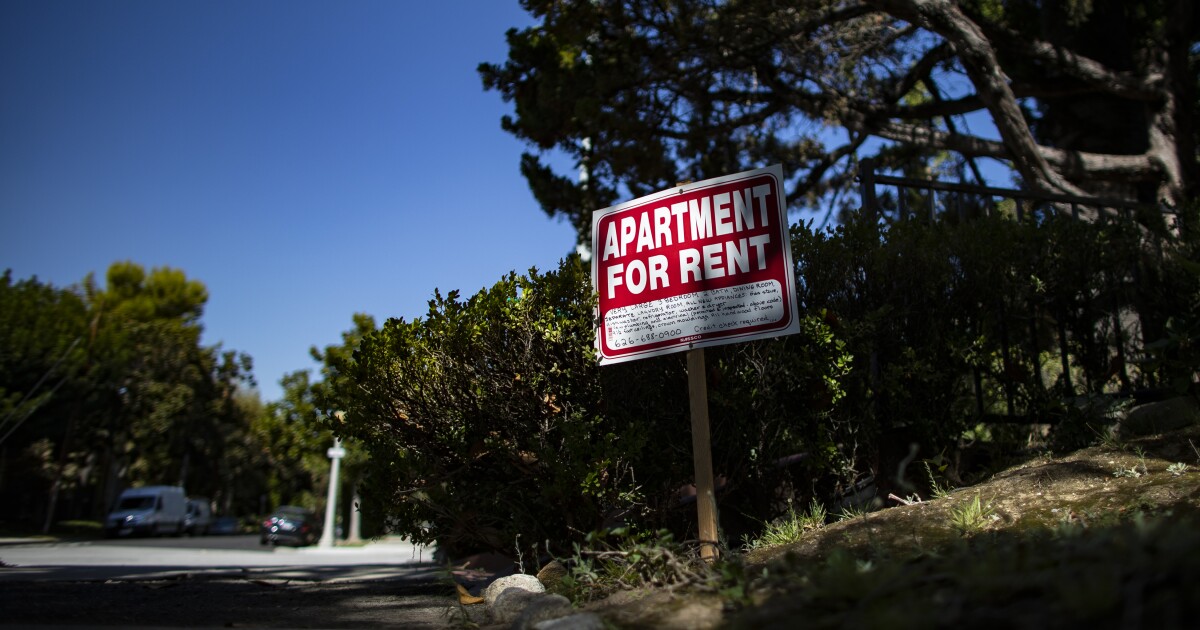
Three Los Angeles City Council members introduced a package of renter-protection measures they say would help promote fair access to housing amid the city’s worsening homelessness crisis.
The motions introduced Wednesday by Council Members Mike Bonin, Marqueece Harris-Dawson and Nithya Raman would significantly restrict what kind of information landlords can ask from prospective tenants.
The proposed ordinances would prohibit screening prospective tenants on the basis of their criminal, eviction or credit histories. Landlords would also be required to publicly display uniform rental criteria before renters pay application fees.
“It’s about making it easier for people to get housed and stay housed” amid the homelessness crisis and evictions that will come if pandemic-era tenant protections are repealed, Bonin said.
Cynthia Strathmann, executive director of the tenant rights organization Strategic Actions for a Just Economy, which consulted on the proposed legislation, said that using credit checks and criminal history to screen potential tenants has discriminatory effects.
“Black and brown folks are much more likely to have low credit and much more likely to be sucked into the criminal justice system, often really unfairly,” Strathmann said. “When you use those as proxies for understanding whether or not somebody is going to be a good tenant, you’re just compounding that problem.”
The California Apartment Assn., a trade group representing rental housing providers, decried the proposed legislation as unnecessary red tape that will increase costs for landlords at a time when some have already been unable to collect rent.
“The people of Los Angeles should be outraged by this proposal which does nothing to get homeless people off the streets or build more homes that Angelenos can afford,” Fred Sutton, senior vice president of local public affairs for the group, said in a statement. “It’s a continued demonstration that some council members are out of touch.”
But Bonin argued that the proposed legislation would make it easier for homeless people to find housing.
“There are lots of people who are homeless who want to be housed and can’t get into an apartment — even if they have a voucher — for a number of reasons,” Bonin said, citing criminal histories and prior eviction proceedings.
The so-called fair chance ordinance would prohibit landlords from asking about an applicant’s criminal history.
Harris-Dawson said he saw the proposed ordinance as a natural corollary to legislation the city passed in 2016 that prohibits most employers from asking about a job applicant’s criminal history until after a conditional offer has been made.
“It provides a pathway for people back into the legal economy,” Harris-Dawson said, characterizing finding a job and a place to live as necessary for successful reintegration.
The ordinance — which would be modeled after similar legislation in Oakland and Berkeley — would allow for “reasonable” exemptions to the ban on asking prospective tenants about criminal history, such as for owner-occupied units or shared living arrangements.
A separate motion would prohibit asking about a prospective tenant’s failure to pay rent or utility bills during the COVID-19 pandemic. That motion would also prohibit landlords or their agents from using credit checks or asking about someone’s credit or eviction history.
It would also prohibit the use of algorithmic or automated tenant screening services to evaluate rental applicants. Landlords or their agents would not to be allowed to ask whether an applicant plans to use or has participated in a rental assistance program.
A third transparency-focused motion would require landlords to disclose the uniform screening criteria that they plan to use to evaluate applicants. That screening criteria would have to be included in any printed or digital advertisements, along with the minimum requirements for eligibility.
Landlords would be required to present a written copy of those requirements and screening criteria during their first interaction with prospective tenants.
That motion would also require landlords to give priority to applicants with mobility disabilities for accessible dwelling units.
